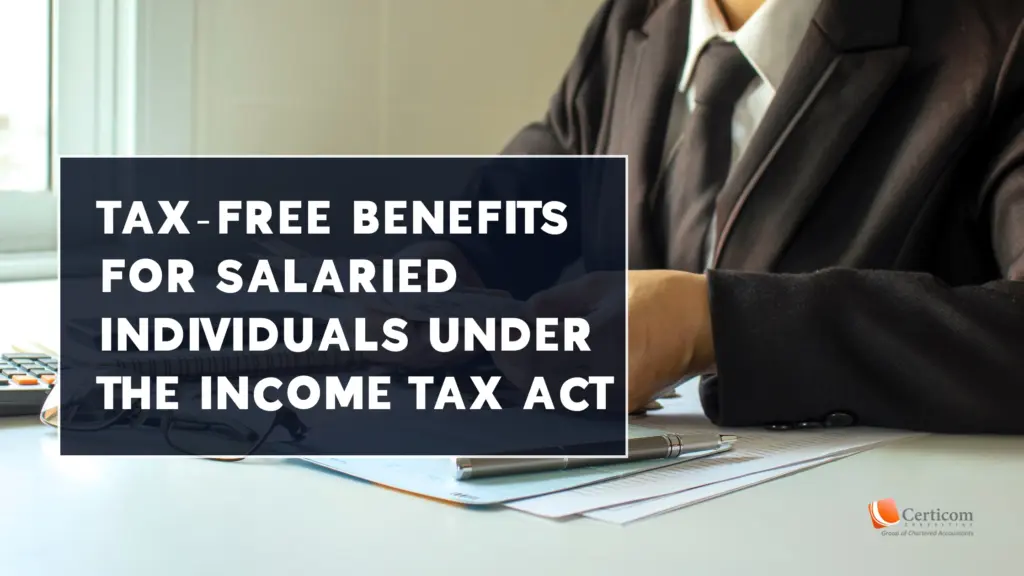Tax-Free Benefits for Salaried Individuals Under the Income Tax Act

Understanding Salary Taxation
Under the Income Tax Act, 1961, salary income encompasses wages, bonuses, and perquisites earned in an employer-employee relationship, governed by sections 15, 16, and 17. Tax is levied on a due or receipt basis, whichever is earlier. However, the Act provides several tax-free benefits to ease the burden on salaried individuals. Here’s a detailed look at these exemptions.
Medical Perks and Tax Exemptions
1. Employer-Run Medical Facilities: Free medical treatment at employer-operated hospitals or dispensaries for employees or their families is exempt from tax.
2. Approved Hospitals: Medical expenses covered by the employer at government-approved hospitals are exempt.
3. Critical Illness Treatment: Costs for treating severe ailments like cancer or heart conditions at specific approved hospitals are tax-free.
4. Health Insurance Plans: Premiums paid for group health insurance or policies under Section 80D qualify for exemption.
5. Overseas Medical Treatment: Medical expenses abroad, including accommodation up to ₹2,50,000 annually (as per RBI guidelines), are tax-free.
6. COVID-19 Medical Expenses: Employer-paid costs for COVID-19 treatment, starting from assessment year 2020-21, are exempt.

Exemptions on Meals and Refreshments
1. Meals at the Workplace: Meals, tea, coffee, and snacks provided during working hours are tax-free.
2. Food Coupons: Meal vouchers worth up to ₹50 per meal are exempt from taxation.
Phone and Internet Allowances
Reimbursements for business-related telephone and internet expenses are fully exempt.
Occasional Gifts and Tokens
Gifts in the form of vouchers or tokens up to ₹5,000 annually are tax-free.
Employer-Provided Computers or Laptops
Computers or laptops given for official or personal use are exempt from taxation.
Recreational and Entertainment Facilities
Facilities for group recreation or entertainment offered by the employer are tax-exempt.
Personal Accident Insurance
Premiums paid by the employer for personal accident insurance policies for employees are exempt, as supported by judicial precedents.
Judges’ Housing and Vehicle Facilities
Perquisites like rent-free housing and official vehicle usage for High Court and Supreme Court judges are exempt from tax.
Exemptions for Government Employees Working Abroad
Salaries for Indian government employees posted abroad are taxable in India. However, foreign allowances and perquisites under Section 10(7) are tax-exempt.

Taxable Perquisites and Additions to Income
Certain employer-provided benefits are taxable, such as:
- Rent-free housing (except specific exemptions).
- Employer payments for personal expenses like club memberships or hotel bills.
- Life insurance premiums paid on behalf of the employee.
Special Considerations for Salary Taxation
1. Taxation on Due Basis: Salary is taxable when due or received, whichever is earlier.
2. Pensions Received Abroad: Pensions for Indian service received abroad are taxable in India, even for non-residents.
3. Exclusions for Private-Sector Employees: Indian private-sector employees abroad do not receive the same exemptions as government employees.
The Income Tax Act, 1961, includes several provisions to make taxation equitable for salaried individuals. By effectively utilizing these tax-free benefits, taxpayers can significantly lower their tax liabilities.
Related Post
Resident’s Guide to Buying NRI Property in India
Flipkart ESOP Compensation: ₹11 Crore Payout – Salary or Capital Receipt?
Book A One To One Consultation Now For FREE
How can we help? *




